Oracle Integration 25.10 builds upon our commitment to intelligent automation and enterprise-grade connectivity, delivering major advancements in native actions, Generative AI, and adapter connectivity. This update introduces powerful new AI-driven capabilities, including pretrained document AI models, speech synthesis, vision batch processing, healthcare-specific language endpoints, and support for Generative AI inputs such as images. This release also expands LLM connectivity through the OpenAI Adapter, which now works seamlessly with multiple providers through the Chat Completions API. Alongside these innovations, new adapters and key enhancements further strengthen security, reliability, and integration flexibility.
New Adapters
- Anthropic Adapter – Introduces connectivity with Anthropic’s Claude models, enabling text prompting and tools/function calling for conversational and AI-assisted workflows.
- Routty Adapter – Provides prebuilt connectivity to the Routty Cloud e-invoicing platform (through REST, SOAP, SFTP, and OCI Object Storage) for streamlined invoice and master data synchronization with Oracle ERP.
AI Native Actions and LLM Adapter Enhancements
This release brings intelligent workflow design closer to reality, with low-code access to powerful AI services across vision, language, document analysis, speech, and LLM connectivity. Key enhancements include:
- OpenAI Adapter Enhancement – Chat Completions, Function Calling, and Broader LLM compatible Connectivity.
- OCI Document Understanding – Multilanguage support, table extraction, confidence scoring for key-value pairs, and new pretrained models for document classification and OCR-based text extraction.
- OCI Language – Healthcare endpoint support, asynchronous batch jobs through OCI Object Storage, and advanced PII-masking options with configurable modes to replace or remove sensitive data.
- OCI Generative AI – Image support, enriched model capabilities such as preamble citation, on-demand access for chat and text embedding, and dedicated model endpoints for reranking and vector-based pipelines.
- OCI Speech – Text-to-speech synthesis and batch processing capabilities, enabling natural audio generation and efficient handling of multiple files in integration flows.
- OCI Vision – Image analysis with batch processing and seamless integration with OCI Object Storage for scalable, automated workflows.
- OCI RAG – Restructured into a simplified, chat-first experience.
Adapter Enhancements
Enhancements across technology and application adapters strengthen security, reliability, and integration flexibility:
- REST Adapter – Mutual TLS (mTLS) support with the on-premises agent.
- Salesforce Adapter– Certified for the Professional Edition.
- FHIR Adapter – Profile management improvements with Resource Viewer and support for multiple implementation guide uploads.
- MLLP Adapter – Ignores extra HL7 segments (while still failing on missing mandatory ones) for improved message resiliency.
- GraphQL Adapter – OAuth Client Credentials and integration with introspection-disabled servers support.
- Adobe Sign Adapter – v6 API support and digital signatures for secure document workflows.
- Snowflake Adapter – External IDP support (Azure AD, Okta) through OAuth Client Credentials.
- PKCE (REST, SOAP, FHIR, Oracle Fusion Field Service, RAB) – OAuth PKCE (code_challenge and code_challenge_method) for stronger authorization flows.
- Microsoft SharePoint Adapter – Auto-renewal of subscriptions for change notifications.
- CPQ Cloud Adapter – OAuth support using JWT user assertion for secure Fusion CPQ integrations.
- OFS Adapter – OAuth 2.0 using the Authorization Code grant type.
- EBS Adapter – Private Endpoint (PE) support for secure access to private deployments.
- AQ Adapter – Certified for Oracle Database versions 21c and 23ai (ATP, ADW, on-premises, and Database Cloud Service).
- Connectivity Agent – Now certified on Oracle Linux 9.x.
***Important Notice: Please replace your Username Password security policy with OAuth in the Salesforce Adapter by the Summer 2027 release***
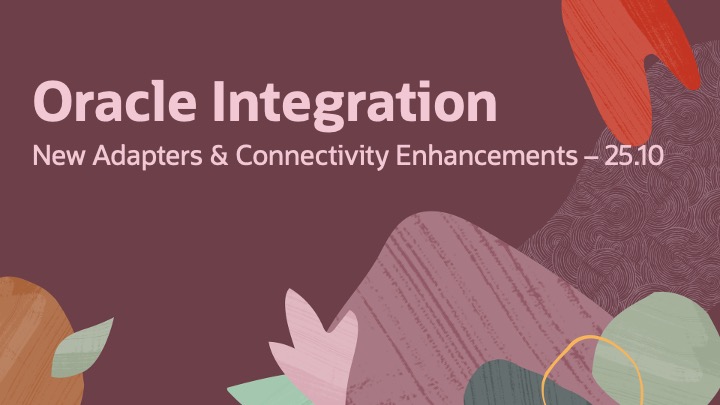
Anthropic Adapter – New Adapter
Introducing the Anthropic Adapter, which enables Oracle Integration to connect with Anthropic’s Claude models and bring advanced large language model (LLM) capabilities into your automation flows.
Key Features:
- Text and Prompting: Send instructions, questions, or conversation prompts to Claude for contextual and coherent responses.
- Tools Calling: Trigger external tools or functions dynamically based on LLM output, enabling action-driven AI workflows.
This adapter allows you to build intelligent use cases such as AI-assisted decision-making, contextual question answering, and content generation.
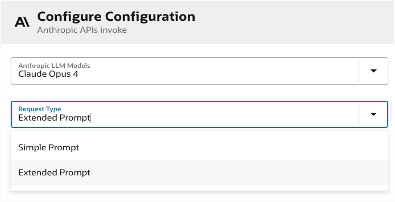
Routty Cloud Adapter – New Adapter
Oracle Integration now supports connectivity with the Routty Cloud e-invoicing platform through a newly added Routty Cloud Adapter. Developed by a trusted Oracle partner, this adapter simplifies integration between Oracle ERP Cloud and Routty Cloud for e-invoicing use cases.
The adapter enables secure and seamless exchange of invoice-related messages, master data, and status updates using a predefined set of projects and endpoints.
Key benefits include:
• Prebuilt connectivity to Routty Cloud.
• REST and SOAP support for ERP messaging.
• Simplified orchestration using Oracle Integration.
• Support for SFTP/OCI Object Storage for queueing.
This partner-developed adapter is designed to be used in conjunction with an accelerator (Automate Invoicing and Master Data Sync Between Oracle ERP and Routty Cloud using Routty Adapter) for faster deployment and configuration.
Note: You can install this adapter from the Integration Store.
What’s New in OIC AI Native Actions and OpenAI Adapter
This release brings intelligent workflow design closer to reality, with low-code access to powerful AI services across vision, language, document analysis, and LLM connectivity.
OpenAI Adapter Enhancement – Broader LLM-Compatible Connectivity and Agentic Flows
The OpenAI Adapter now provides extended support for large language models (LLMs) beyond OpenAI, along with advanced agentic capabilities. With this release, the adapter supports:
- Responses API – Enables interaction exclusively with OpenAI models. This API is suited for tasks such as text generation, summarization, or creating content directly from OpenAI.
- Chat Completions API – A provider-agnostic interface that extends compatibility to other LLM vendors, such as Anthropic and others that adopt the Chat Completion API.
- Chat Completions with Function Calling / Agentic Flows – Supports multi-turn dialogs and orchestrated behaviors, allowing LLMs to invoke downstream tools, APIs, or actions as part of a conversation. This enables intelligent agentic workflows that go beyond simple text generation.
This enhancement transforms the OpenAI Adapter into a compatibility and orchestration layer across multiple LLM providers. By simply updating the connection URL and model selection, the same adapter can connect to different LLMs, reducing dependency on a single vendor while enabling experimentation with diverse models and agentic workflows.
Examples of usage include:
- Generating product descriptions through the Responses API with OpenAI models.
- Building safety-focused conversational flows by connecting to Anthropic through the Chat Completions API.
- Combining different providers in workflows, such as performing summarization with OpenAI, reranking with Anthropic, and translation with a Google model.
- Creating multi-turn agentic workflows that query a knowledge base, invoke APIs, and respond to users in a conversational thread.

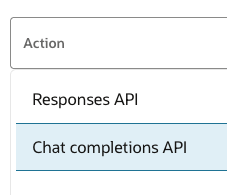
OCI Document Understanding Enhancement – Pretrained Models and Text Extraction
- New Pretrained Models
- Classification support for: Bank Statement, Check, and Payslip
- Key-Value extraction support for Health Insurance ID
- Text Extraction
- Extract raw text from documents using OCR-based capabilities—ideal for processing unstructured inputs.
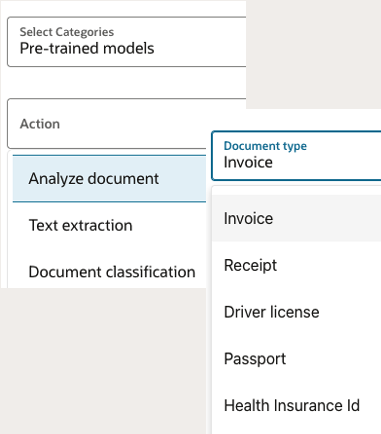
- Table extraction: Native actions can now extract structured tables (rows, columns, cells) with labels, enabling downstream workflows to understand and process tabular data.
- Confidence scoring for key-value pairs: Each extracted key/value is now delivered with a confidence measure, making it easier to route uncertain data for review or apply fallback logic.
- Multi-language support: Document models now recognize and extract information from documents in many more languages (for example, French, Spanish, Japanese, Chinese, Arabic, and more), enabling global processing without custom training.
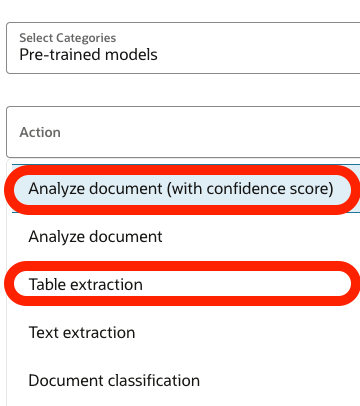
OCI Vision Enhancement – Batch Processing and Object Storage Integration
- Supports batch image processing, allowing users to analyze multiple images in one go.
- Vision actions can now pull files directly from OCI Object Storage buckets—ideal for scalable automations.
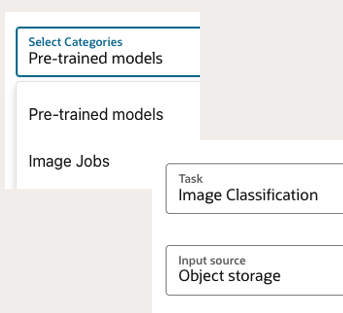
OCI Generative AI Enhancement – On-Demand and Dedicated Model Access
- On-Demand Model:
- chat – conversational flows
- embed text – vector representation for similarity search
- Dedicated Model:
- rerank – prioritize outputs for search/retrieval
- embed – for advanced vector pipelines
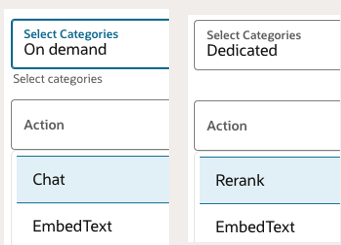
- Image inputs for Generative AI prompts: Native actions can now accept images or full documents as part of the prompt context—for example, asking for summaries or explanations of charts, diagrams, or long PDFs.
OCI Speech Enhancement – Speech Synthesis and Batch Mode Support
- Supports batch mode, enabling large-scale audio processing such as transcription or speech synthesis of multiple files in a single operation.
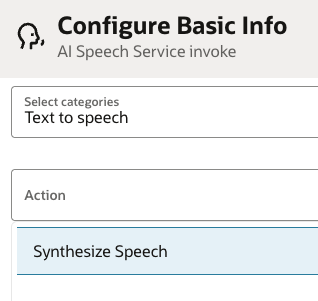
OCI Language Enhancement – Advanced PII / PHI Masking Options
Enhances PII detection with support for configurable masking modes, allowing sensitive data to be replaced or removed—helping organizations meet privacy and compliance requirements.
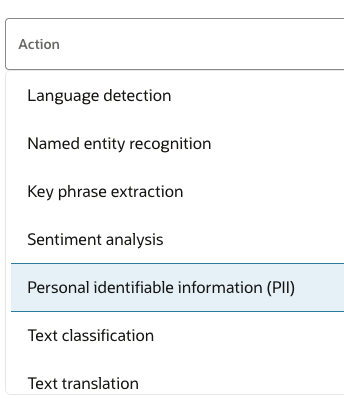
Asynchronous batch processing via Object Storage: Push document sets into OCI Object Storage and run large-scale jobs in batch mode, with callbacks or polling for completion. Ideal for large-volume workflows.
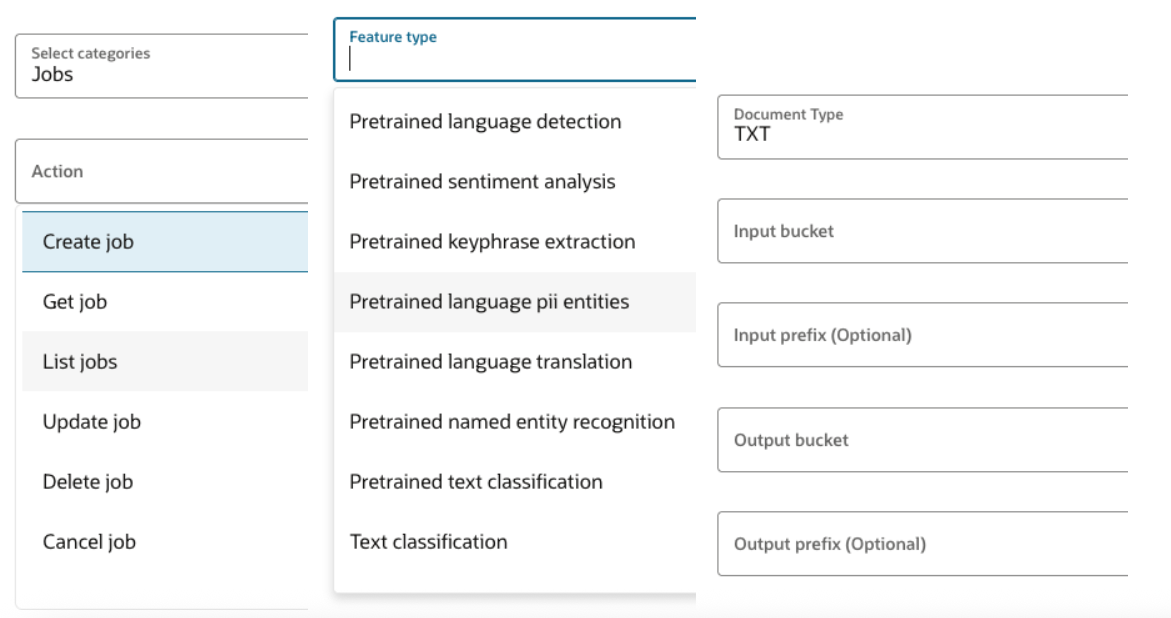
Healthcare Endpoint Support: New models tuned for clinical/healthcare text enable safe extraction of medical entities, with care around PHI / sensitive data.
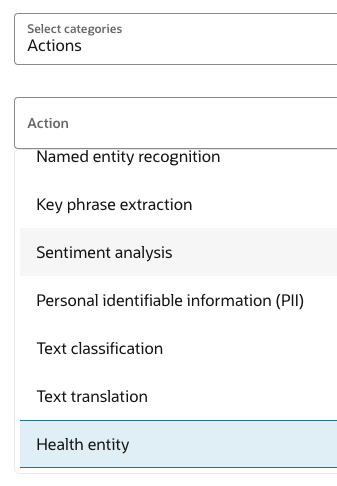
Salesforce Customer Announcement – Retirement of Username Password Policy
Salesforce plans to retire its Username Password authentication policy with the Summer 2027 release. In the Salesforce (SOAP) Adapter, this policy is not supported for API versions 65 or later, but remains available for versions 31 to 64 until the Summer 2027 release. See SOAP API login() Retirement.
Therefore, Salesforce (SOAP) Adapter customers are strongly advised to upgrade their existing connections to use either the Authorization Code Credentials or Resource Owner Password Credentials security policy.
Alternatively, create any new connections using only these two supported authentication methods moving forward.
FHIR Adapter Enhancements – Resource Viewer and Multiple Profile Uploads
Several improvements have been added to the FHIR Adapter to enhance profile visibility and message flexibility:
- FHIR Resource Viewer Support
Enables browsing of uploaded FHIR profile packages—such as StructureDefinitions, ValueSets, and CodeSystems—directly within Oracle Integration. This provides immediate visibility into resource definitions for validation and configuration purposes.
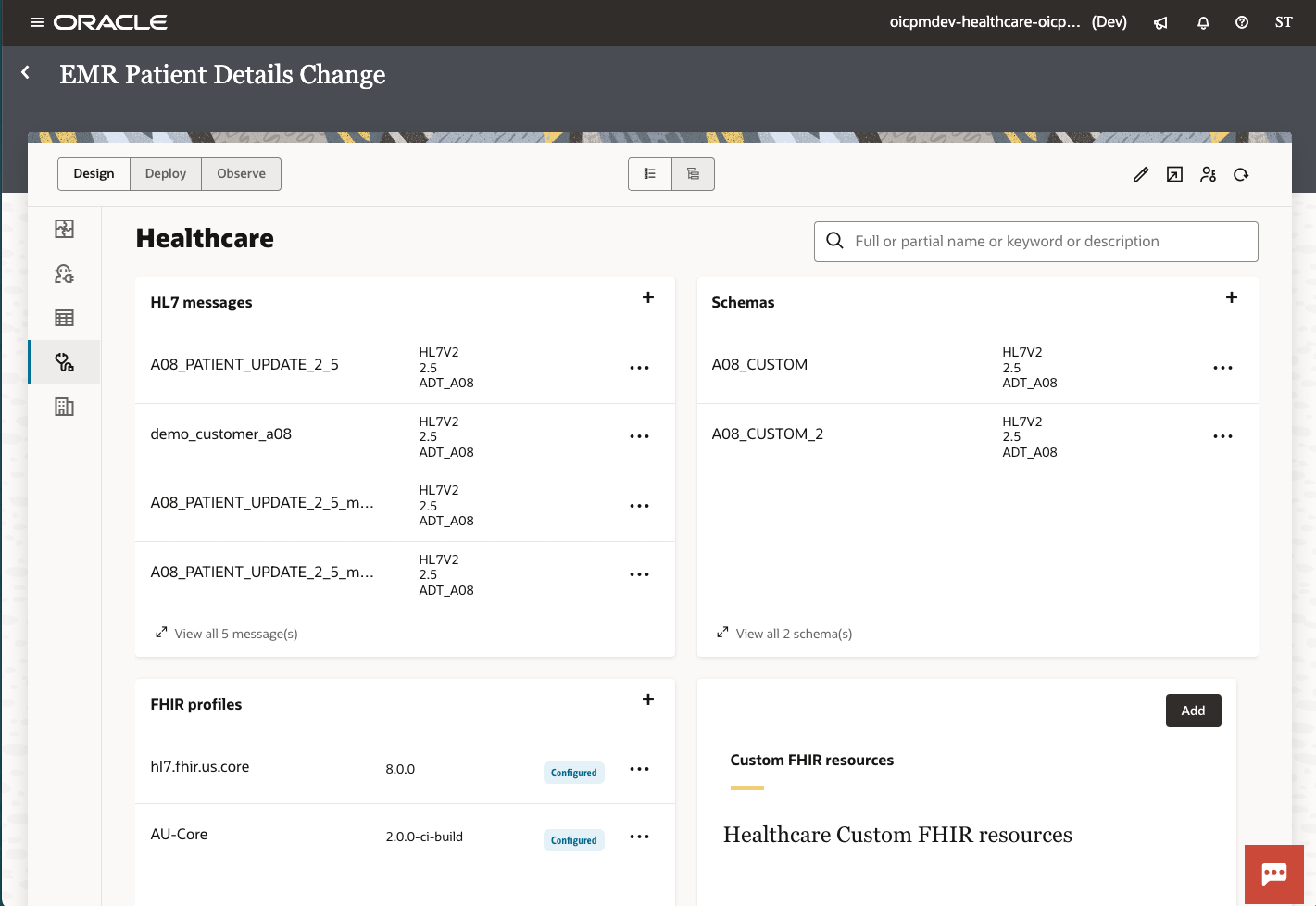
- Improved FHIR Profile Handling
Supports uploading multiple implementation guide package files per project, allowing management of complex integration scenarios involving multiple custom profiles.
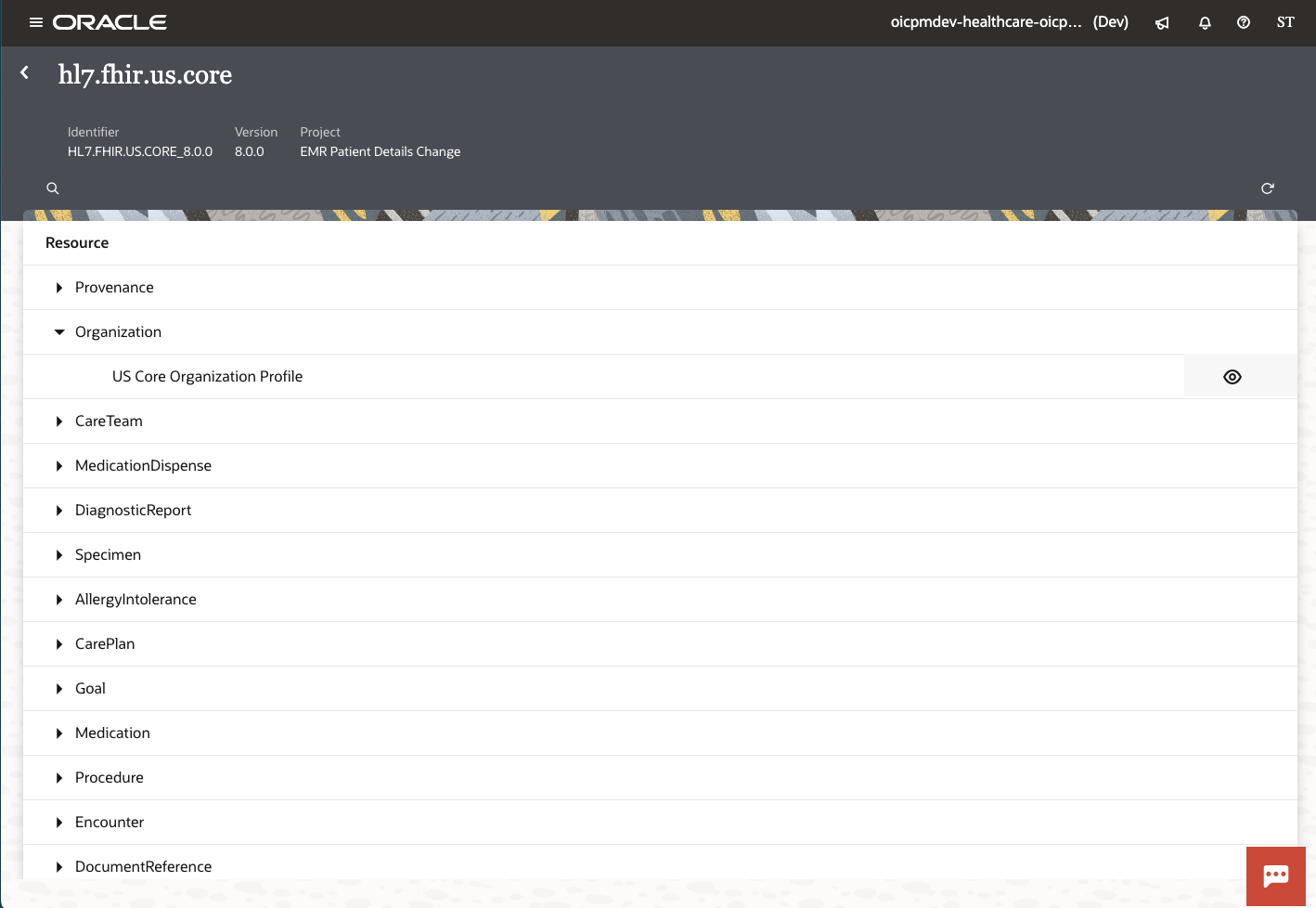
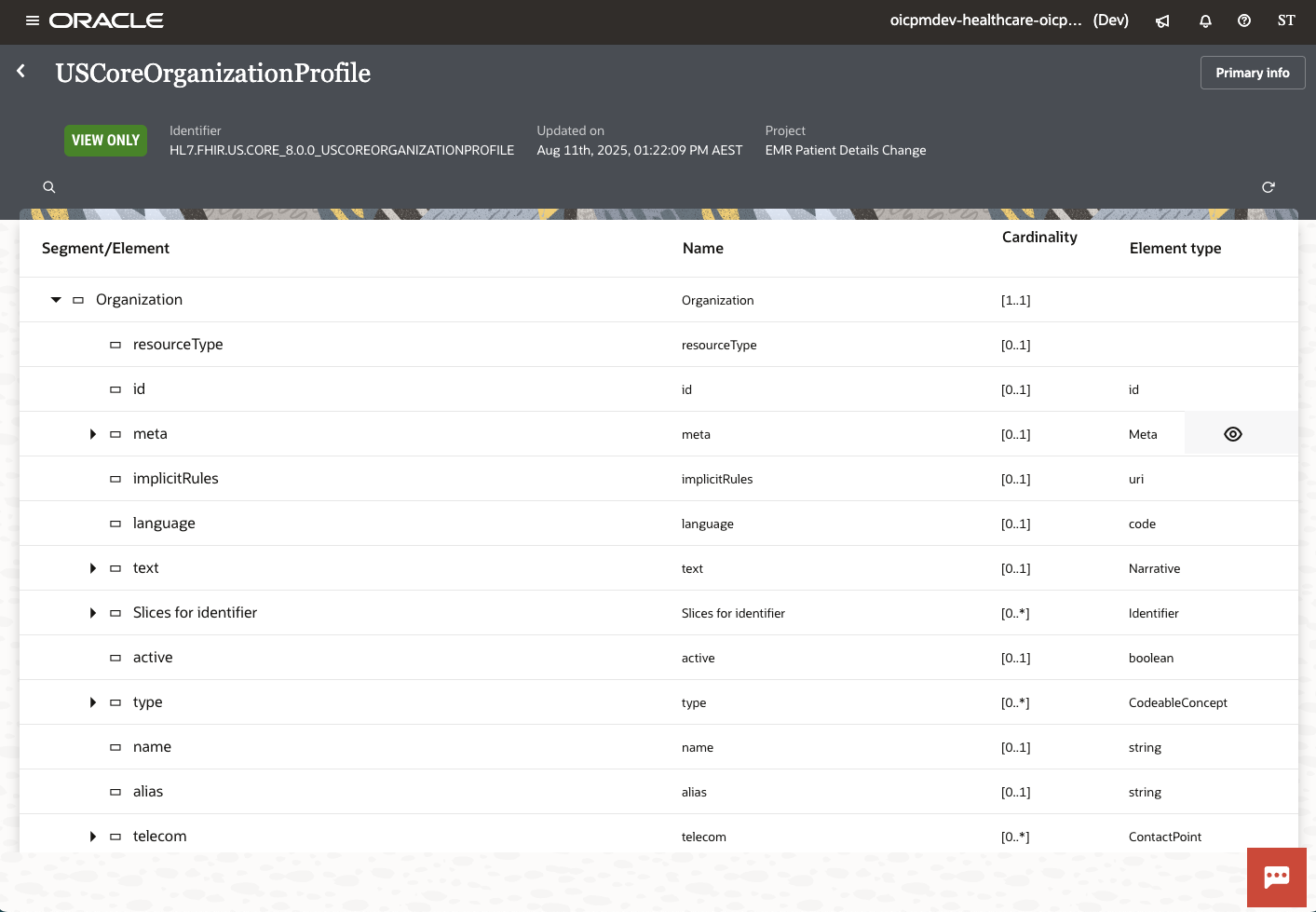
MLLP Adapter Enhancement : Flexible Handling of Extra HL7 Segments
We’ve enhanced the MLLP adapter in Oracle Integration to better handle real-world HL7 message variations. Previously, incoming messages with extra segments—those not configured in the integration—would cause the message to fail.
-
Messages with additional HL7 segments are now accepted, not rejected.
-
Oracle Integration will ignore extra segments and process only the ones defined in the integration.
-
No changes are required to enable this behavior—it’s on by default.
However, if any configured (expected) segments are missing, the message will still fail, preserving data integrity.
RAB Infrastructure Enhancement – Support for Private Endpoints in Invoke Operations
As part of this release, RAB adapters now support private endpoints for invoke operations. This enhancement provides greater security and control by allowing adapter traffic to be routed through the customer’s private network. In secure egress scenarios, where the adapter connects to a public endpoint, the traffic automatically takes the NAT Gateway route configured in the customer’s VCN.
With this enhancement, RAB adapters can now connect securely using private network routes, ensuring compliance with enterprise security standards, and all outbound traffic will follow the configured private path while still supporting integrations that need to reach public APIs through controlled egress.
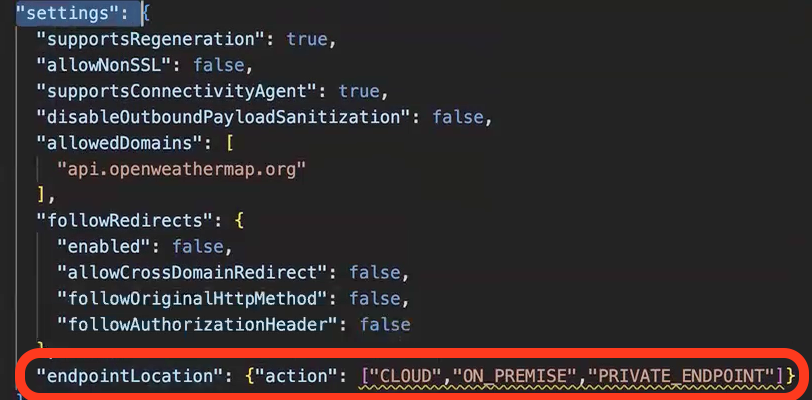
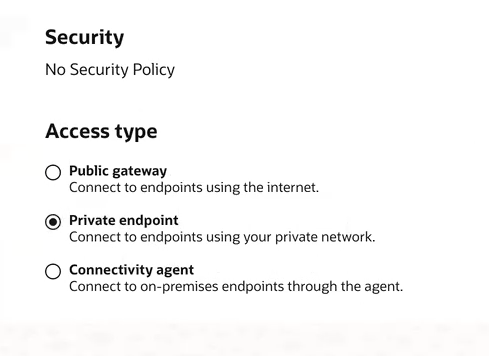
REST Adapter Enhancement – Mutual TLS Support with the Connectivity Agent
The REST Adapter now supports Mutual TLS (mTLS) communication with the connectivity agent. This feature was available earlier only for cloud integrations. mTLS now extends to agent-based REST calls, enabling secure two-way SSL communication with internal systems.
This enhancement ensures that customers using on-premises agents achieve the same level of certificate-based security as cloud-based integrations, providing end-to-end protection for sensitive REST calls.

Slack Adapter Enhancement – Trigger Support
The Slack Adapter now supports trigger-based integrations in Oracle Integration, enabling flows to start automatically when Slack events occur:
- App Mention (app_mention) – Trigger an integration whenever someone mentions the Slack app in a channel (for example, @HelpDesk). This capability can automatically create a Jira issue or ServiceNow ticket.
- Direct Message (message.im) – Start a workflow when a user sends a private message to the app. For instance, direct messages can be routed as HR requests or logged into a self-service help desk flow.
- Channel Message (message.channels) – Capture when someone posts in a channel where the app is present. This can log project updates into an ERP system, track compliance keywords, or send daily summaries to managers.
For trigger connections, the adapter uses the Signing Secret from your Slack app to validate events. Invoke connections continue to support the Custom Security Policy.
With this enhancement, you can build event-driven workflows that respond instantly to Slack activity, seamlessly linking conversations with business processes.

Adobe Sign Adapter Enhancement – v6 API Support and Digital Signature Enablement
The Adobe Sign Adapter now includes enhanced support through v6 APIs, enabling improved integration capabilities and a more guided configuration experience. A new adapter wizard simplifies the setup process for v6 connections, making it easier to build and manage document signing workflows.
As part of this update, the adapter introduces digital signature support, allowing secure, certificate-based signing flows to be orchestrated directly within integration processes.
Configuration Page (Invoke)
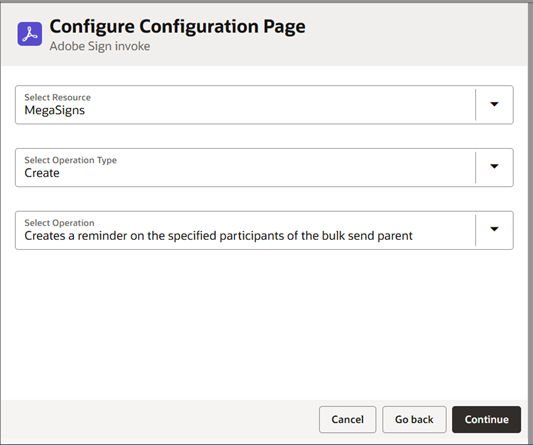
Note: The latest configuration flow supports only v6 APIs for new connections. Adding new invokes or endpoints to v5-based connections is now restricted.
GraphQL Adapter Enhancement – OAuth Client Credentials and Introspection-Free Server Support
The adapter now supports integration using the OAuth Client Credentials security policy, in addition to the existing five security policies: API Key-Based Authentication, a header-based security policy, OAuth Authorization Code Credentials, No Security Policy, and Basic Authentication.
Also, the adapter allows integration with application servers that have introspection disabled. In such cases, you should manually provide the GraphQL response JSON for configured queries on the Operation Page in Oracle Integration (OIC).
Since introspection is disabled, the adapter cannot retrieve the application server schema, construct response payloads, and validate the GraphQL query. Therefore, enabling introspection on the application server is recommended to fully leverage the adapter’s capabilities and enhance the integration experience.
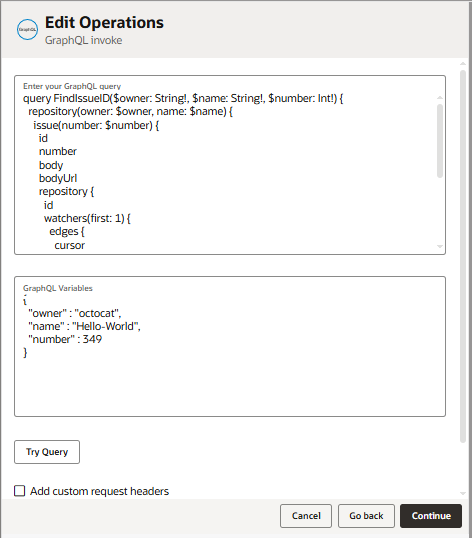
Snowflake Adapter Enhancement – Support for External Identity Providers with the Client Credentials Security Policy
The Snowflake Adapter now supports Client Credentials authentication using external identity providers (IDPs) such as Azure AD, Okta, and PingFederate. This enhancement enables secure, token-based access to Snowflake without relying on user-interactive (three-legged) OAuth flows.
To implement this, you must configure an external application in your chosen IDP (for example, Azure AD) and obtain the necessary values—Client ID, Client Secret, and Scopes—from the authorization server. These credentials are then used to obtain an access token for authenticating Snowflake connections.
Note: This enhancement introduces changes only to the security configuration. The connection properties and runtime behavior remain consistent with existing OAuth-based integrations.
If incorrect credentials (such as an invalid client ID) are provided, meaningful error messages are returned to help you diagnose authentication issues.
To learn more about how external OAuth works with Snowflake—including setup with identity providers (IDPs) such as Azure AD and Okta—refer to the External OAuth Overview in the Snowflake Documentation.
Security Enhancement- Support PKCE (Proof Key for Code Exchange)
Oracle Integration now supports the PKCE in the 3-legged OAuth security policy in the following adapters:
- REST Adapter
- SOAP Adapter
- FHIR Adapter
- Oracle Field Service Cloud Adapter
Along with these adapters, we also support the PKCE Rapid Adapter Builder (RAB) infrastructure.
When using the 3-legged OAuth grant type, PKCE mitigates interception attacks, especially for public clients that cannot securely store a client secret. Upon authorization, the adapter automatically includes the code_challenge and code_challenge_method parameters in the request to the authorization server, ensuring compliance with PKCE-enabled OAuth flows.
This enhancement strengthens security across integrations, aligning with industry best practices for protecting sensitive data.
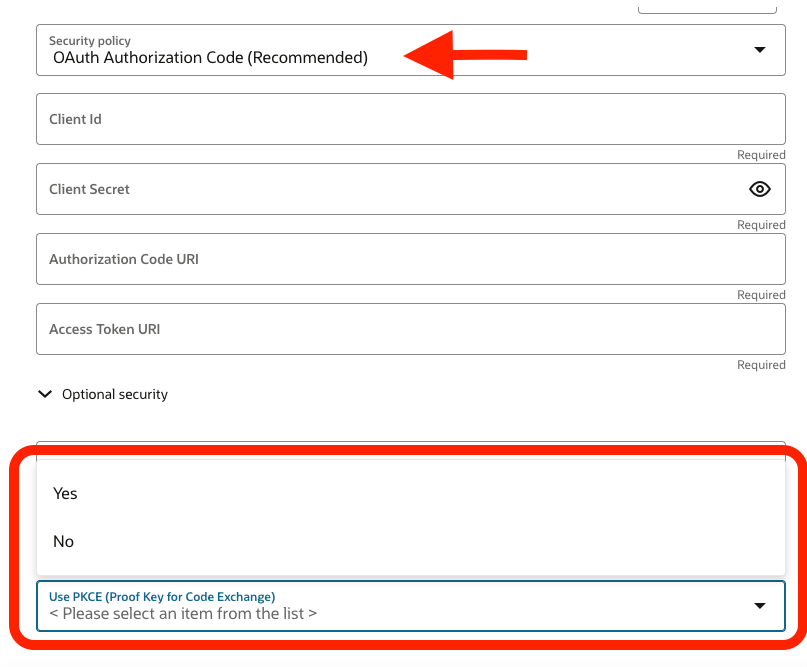
Certified the Salesforce Adapter for Integration with Salesforce Professional Edition
With this release, the Salesforce Adapter is certified for use with the Salesforce Professional Edition (PE). Customers can execute a wide range of SOAP operations, including:
- CRUD
- Bulk and Bulk 2.0 CRUD
- Core and utility
- Query (SOQL and SOSL)
- Consume Apex classes
Event-driven integrations (outbound messages, platform events, and change data capture) are not supported with this Edition.
The adapter supports only the Resource Owner Password Credentials (ROPC) security policy when working with the Professional Edition.
To know more about the compatibility and operations supported, see Understand the Salesforce Adapter.
Oracle CPQ Cloud Adapter Enhancement – OAuth Support for Fusion CPQ Integration
The Oracle CPQ Cloud Adapter now supports OAuth authentication using JWT user assertion, aligning with Fusion CPQ’s modern security requirements. You can now choose between the Username/Password and OAuth options during connection setup. This enhancement strengthens security for inbound CPQ API calls from Oracle Integration.
OFS Adapter Enhancement – OAuth 2.0 Authorization Code Support
The OFS (Oracle Fusion Field Service) Adapter now supports OAuth 2.0 authentication using the Authorization Code grant type, in addition to existing Basic Authentication and Client Credentials options. This enhancement brings the adapter in line with modern security standards, enabling more secure and flexible integrations with OFS cloud environments.
Microsoft SharePoint Adapter Enhancement – Autorenewal of Subscription
Until the 25.06 release, customers were required to manually renew their subscriptions to receive any event change notifications in Oracle Integration. However, with this release, the adapter now supports auto renewal of subscriptions, offering a more seamless and hassle-free experience for users.
Certified Connectivity Agent Support for Oracle Linux 9.x
The connectivity agent is now certified to run on the following additional operating system:
- Oracle Linux: 9.x
This extends compatibility beyond the previously supported versions (6.x to 8.x), ensuring secure and reliable hybrid integrations in the latest Oracle Linux environments.
Oracle E-Business Suite Adapter Enhancement – Private Endpoint Support Enabled
The Oracle E-Business Suite Adapter supports connectivity through a private endpoint (PE), allowing connections to both publicly accessible resources (over the public internet) and private resources within your OCI Virtual Cloud Network (VCN). This enhancement improves security and enables seamless integration with Oracle E-Business Suite instances deployed in private network environments.
Certified the Oracle Advanced Queuing (AQ) Adapter to Support New Database Versions
The Oracle Advanced Queuing (AQ) Adapter is now certified on the following platforms:
- Oracle Database On-Premises: 21c and 23ai
- Oracle Autonomous Data Warehouse (ADW): 21c, and 23ai
- Oracle Autonomous Transaction Processing (ATP): 21c, and 23ai
- Oracle Database Cloud Service: 21c and 23ai
